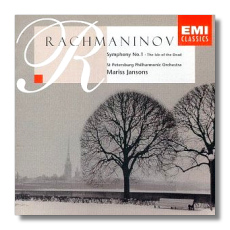
The Internet's Premier Classical Music Source
Related Links
- Rachmaninoff Reviews
- Latest Reviews
- More Reviews
-
By Composer
-
Collections
DVD & Blu-ray
Books
Concert Reviews
Articles/Interviews
Software
Audio
Search Amazon
Recommended Links
Site News
 CD Review
CD Review
Sergei Rachmaninoff

- Symphony #1 in D minor, Op. 13 (1895)
- Symphonic Poem "Isle Of The Dead" Op. 29 (1909)
St. Petersburg Philharmonic Orchestra/Mariss Jansons
EMI 56754
It is interesting how a recording of a work can transform my perception of the music. A few years ago I purchased Otaka's recording of the 1st Symphony on Nimbus. I played it a few times and then filed it in the wine cellar with the other CDs I sometimes listen to. Then I got this EMI release and WOW!
This is instantly recognizable as Rachmaninoff. I looked at the photo of the 24-year-old composer just a few years before this symphony was premièred. What a beautiful, fragile looking young man. His eyes are all sadness already. I can hear influences from Tchaikovsky (especially the Pathétique) Kallinikov, Rimsky-Korsakov and even Mussorgsky at moments. Still, the voice may be similar but the accent is purely Rachmaninoff. I find it odd that it has gotten such short shrift by writers.
True, the symphony is not as coherent as the other two. True, Rachmaninoff recycled some of the musical ideas in the later symphonies and the Dances. (Listen to the close of the third movement, I swear this phrase was used somewhere in one of those. I do not have a score to pinpoint the place, and even if I did I confess that scores soon have the effect of looking at spots on a Dalmatian.) Perhaps it is in spirit that I hear the foreshadows of the later works, but I hear them none-the-less.
The opening movement is pure "RUSSIAN". It is mysterious, ominous, it is here that I detect moments of "Boris". It flows like the Don in melancholy. It is achingly beautiful.
The third movement is one of the most beautiful largettos I know. In it a plaintive melody emerges, no it haunts the melody that is there and then transforms to an existence of its own. When I first became aware of it, I was befuddled. I could swear there is an accordion or some such instrument. I sought help from members of the Internet forum I participate in. I found out that there is no odd instrumentation and that the instrument was likely an oboe. If so, I'd like to know how Jansons got the oboist to play that way. It is absolutely fascinating.
The final movement is Rachmaninoff's "Marche Slav". It is dramatic, it is passionate, and it is movie music of a high order. The opening of the movement has an MGM type of flourish to it. I love it.
This is an interesting piece of music. Rachmaninoff never published the symphony. The composer was devastated by the initial reception it got. That well could have been because the conductor was Glazunov drunk according to some accounts. At any rate, it is still treated like a bastard child. Steinberg, in his excellent book The Symphony, doesn't even discuss it. I think it is well worth listening to.
Then there is "The Isle of the Dead". I would rank it equal with Reiner's different account with the Chicago Symphony. This is a more lush, romantic interpretation. In some ways it recalls Stokowski's live performance with the Hollywood Bowl Symphony in 1946. (On Pearl 9261 coupled with Tchaikovsky's Pathétique, also with the HBoston Symphony Orchestra) Like Stokowski's Jansons' interpretation is moody, it is depressing. What higher recommendation can you ask?
After listening, again, to the Otaka, I retired it to the cellar once more. The critic in Gramophone gave it a lukewarm review and suggested waiting for Plentnev's recording. No need to wait.
Copyright © 1999, Robert Stumpf II


















